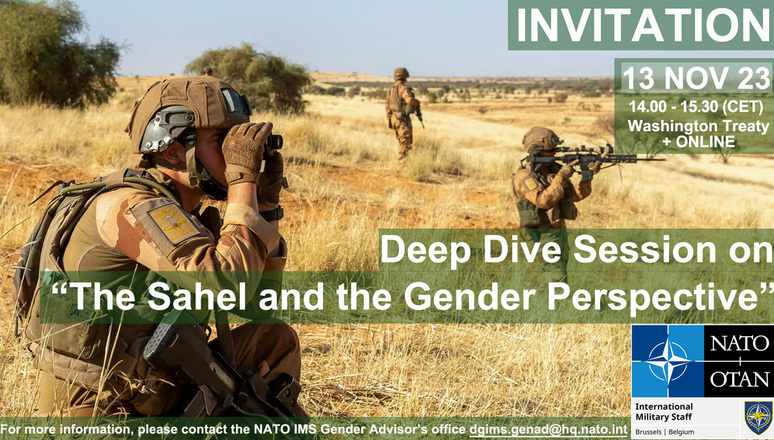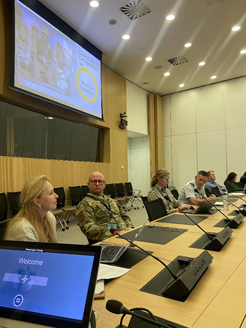Deep Dive Recap: the Sahel and the Gender Perspective
On 13 November 2023, the NATO International Military Staff (IMS) Office of the Gender Advisor convened its third regional Deep Dive session on the Sahel and the Gender Perspective. The discussion centred on the challenges that women and girls face in the region in amidst volatile political and security environments. It also explored how different local and international actors are promoting the Women, Peace, and Security (WPS) agenda in the Sahel.

Subject matter expertise was provided by Dr. Nina Wilén, Associate Professor at Lund University and Director of the Africa Programme at Egmont Royal Institute for International Relations; Lieutenant Colonel Samuel Jesus, Portuguese Army Officer, and former Gender Advisor in the Central African Republic (CAR); and Mr Philippe van Amersfoort, Head of the Partnership for Security and Stability in the Sahel Secretariat at the European External Action Service (EEAS).

Dr. Wilén began the session by highlighting the tensions between norms and interests in the Sahel. Military coups and internal competition have had a significant impact on the G5 Sahelian countries of Mali, Niger, Chad, Burkina Faso, and Mauritania in recent years. She explained that as a result, actors favour hard security interests over normative arguments. While gender is supposed to be transversal and prioritised, it is consistently overlooked and underfunded by international, state, and non-state actors in the region. This is not a new phenomenon, but dates back to before the recent coup wave.
Dr. Wilén then contextualised the current state of the WPS agenda and the situation for women and girls in the Sahel – a region with the highest birth rates in the world, prevalent forced marriage , and large gender literacy gaps. Dr. Wilén explained that the G5 Sahel countries of Mali, Niger, Burkina Faso, and Chad all have or have had WPS National Action Plans (NAP). However, there are concerns that these will not be prioritised in the wake of the recent coups. She cited the 2023 Dansk Institute for International Studies report, which found that the Malian government increasingly prioritises the security sector while ignoring the 30% female participation quota. Furthermore, interviews from the same report noted that the Malian Ministry of Defence had no knowledge of the country’s NAP or the WPS agenda. Pointing to broader trends for women in leadership roles, Dr. Wilén emphasised that the proportion of women in politics in Mali, Niger, and Chad remained, in theory, around 25-29% to 20-24%, but it was not always reflected in practice. Based on interviews conducted in Niger, Dr. Wilén identified several obstacles to women’s empowerment in the region. These include expectations of excellence, the double burden of being a good wife and mother before pursuing a career, and the need for a man’s support to succeed.
Concluding her presentation, Dr. Wilén pointed out that since 2020, four out of the five G5 Sahelian states are now under military rule following coups. This has also resulted in an increase in militant group attacks on civilians, as well as in a high number of internally displaced people, with over 2 million in Burkina Faso alone. She argued that in this volatile political and security environment, external actors must reconsider how they engage with authoritarian leaders, civil society and local actors and lower their initial ambitions regarding the normative agendas.
Taking the floor next, Lieutenant Colonel Jesus discussed his experience as a Gender Advisor in the CAR as part of the EU Training Mission (EUTM), which provided operational advice, education, and training to local authorities. He reflected on the WPS progress made during his time in the CAR from October 2020 to September 2021. This included increased female representation in public offices and the implementation of the parity law, which required women to hold at least 35% of positions in both public and private sectors. However, Lieutenant Colonel Jesus emphasised that problems persist. Despite the parity law, the proportion of women in public administration only increased from 8% to 12% in the 2021 elections. In addition, women and girls are disproportionately affected by weak justice systems, gender-based violence, limited education, and low literacy rates.
Lieutenant Colonel Jesus stated that the CAR has been experiencing ongoing and persistent conflict since 2012. Conflict related sexual violence (CRSV) is frequently used as a tool in war, affirming the critical importance of external troops’ commitment to combating and preventing CRSV. The EUTM assisted the CAR authorities in integrating the Gender Perspective in three domains: participation, protection, and prevention – encouraging female involvement at all levels. Lieutenant Colonel Jesus underlined that the EUTM Gender Action Plan and human rights trainings have resulted in a reduction in CRSV cases reported by civil society and the government. However, while basic gender training has been conducted for the CAR military forces, he explained that it should be more comprehensive, requiring Gender Action Plans and gender-focused leadership and analysis at all levels. Lieutenant Colonel Jesus concluded by discussing the advantages of collaborating with NGOs and local organisations in the CAR. When the EUTM identified key stakeholders to broaden mission impacts, strengthening these relationships brought them closer to civil society and provided them with a better understanding of mission information.
Mr. van Amersfoort closed the session by highlighting the EU’s concerns about engaging and cooperating with some of the governments in place in the Sahel post-military coups. He noted that the Sahel G5 had adopted a Human Rights Compliance Framework to ensure adherence to international humanitarian law, that the International Coalition for the Sahel had incorporated the WPS agenda into its Roadmap, and that some countries of the region have adopted NAPs, which provide a framework and set of standards to move the issue forward. However, he continued to note the extent to which the agenda advances is determined by the countries of the Sahel’s capacity and willingness. The region’s current security crisis exacerbates gender inequality, violence, and risks to women and girls. He argued that military regimes had also reduced the space for civic participation, including women’s groups, a situation exacerbated by the lack of credible roadmaps for bringing military-ruled countries back to democracy.
Mr. van Amersfoort explained the ways in which the EU positions itself on the WPS agenda in the Sahel. The EU is updating its conflict analysis guidelines and framework in the light of the ongoing developments in the Sahel to ensure that gender is integrated throughout. He stated that the EU had developed operational guidelines for gender training in both civilian and military missions. The EU missions in Mali and Niger, for example, incorporate the WPS agenda into their capacity-building and awareness-raising activities. He also highlighted that a centre for victims of gender-based violence was established in the south of Mali and that in Niger, the EU mission had implemented a mentoring programme to help Nigerian women enter the judiciary. Mr. van Amersfoort concluded by emphasising that the EU is at a critical juncture in its strategic thinking about the region, and that WPS should be incorporated into future policy orientations.
The turbulent political and security environment in the Sahel poses a significant challenge to the advancement of the WPS agenda and the integration of the Gender Perspective. The experience of military coups and internal competition means that hard security interests are prioritised over normative issues such as gender. However, WPS and hard security do not need to be mutually exclusive. WPS can strengthen hard security and should be considered alongside it to help with peace building efforts. It is important that international actors working in the Sahel continue to collaborate with and leverage the knowledge of local actors and civil society in order to find new ways to promote the WPS agenda.
